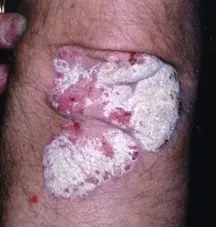What is Psoriasis?

Psoriasis is a chronic skin disorder that causes scaling and inflammation.
Psoriasis may develop as a result of an abnormality in the body's immune system. The immune system normally fights infection and allergic reactions.
Psoriasis probably has a genetic component. Nearly half of patients have family members with psoriasis.
Certain medications may trigger psoriasis. Other medications seem to make psoriasis worse in people who have the disease.
|
|
Symptoms
Psoriasis causes skin scaling and inflammation. It may or may not cause itching. There are several types of psoriasis:
- Plaque psoriasis. In plaque psoriasis, there are rounded or oval patches (plaques) of affected skin. These are usually red and covered with a thick silvery scale. The plaques often occur on the elbows, knees, scalp or near the buttocks. They may also appear on the trunk, arms and legs.
- Inverse psoriasis. Inverse psoriasis is a plaque type of psoriasis that tends to affect skin creases. Creases in the underarm, groin, buttocks, genital areas or under the breast are particularly affected. The red patches may be moist rather than scaling.
- Pustular psoriasis. The skin patches are studded with pimples or pustules.
- Guttate psoriasis. In guttate psoriasis, many small, red, scaly patches develop suddenly and simultaneously. Guttate psoriasis often occurs in a young person who has recently had strep throat or a viral upper respiratory infection.
About half of people with skin symptoms of psoriasis also have abnormal fingernails. Their nails are often thick and have small indentations, called pitting.
A type of arthritis called psoriatic arthritis affects some people with psoriasis. Psoriatic arthritis may occur before skin changes appear.
Diagnosis
Your doctor will look for the typical skin and nail changes of this disorder. He or she can frequently diagnose psoriasis based on your physical examination.
When skin symptoms are not typical of the disorder, your doctor may recommend a skin biopsy. In a biopsy, a small sample of skin is removed and examined in a laboratory. The biopsy can confirm the diagnosis and rule out other possible skin disorders.
Expected Duration
Psoriasis is a long-term disorder. However, symptoms may come and go.
Prevention
There is no way to prevent psoriasis.
Treatment
Treatment for psoriasis varies depending on the:
- Type of psoriasis
- Amount and location of affected skin
- Risks and benefits of each type of treatment
Treatments for psoriasis include:
- Topical treatments. These are treatments applied directly to the skin.
- Daily skin care with emollients for lubrication. These include petroleum jelly or unscented moisturizers.
- Corticosteroid creams, lotions and ointments. These may be prescribed in medium and high-strength forms for stubborn plaques on the hands, feet, arms, legs and trunk. They may be prescribed in low-strength forms for areas of delicate skin such as the face.
- Calcipotriol (Dovonex) slows production of skin scales.
- Tazarotene (Tazorac) is a synthetic vitamin A derivative.
- Coal tar
- Salicylic acid to remove scales
- Phototherapy. Extensive or widespread psoriasis may be treated with light. Phototherapy uses ultraviolet B or ultraviolet A, alone or in combination with coal tar.
- A treatment called PUVA combines ultraviolet A light treatment with an oral medication that improves the effectiveness of the light treatment.
- Laser treatment also can be used. It allows treatment to be more focused so that higher amounts of UV light can be used.
- Vitamin A derivatives. These are used to treat moderate to severe psoriasis involving large areas of the body. These treatments are very powerful. Some have the potential to cause severe side effects. It's essential to understand the risks and be monitored closely.
- Immunosuppressants. These drugs work by suppressing the immune system. They are used to treat moderate to severe psoriasis involving large areas of the body.
- Antineoplastic agents. More rarely, these drugs (which are most often used to treat cancer cells) may be prescribed for severe psoriasis.
- Biologic therapies. Biologics are newer agents used for psoriasis that has not responded to other treatments. Psoriasis is caused, in part, by substances made by the immune system that cause inflammation. Biologics act against these substances. Biologic treatments tend to be quite expensive.
Treatment options
The following list of medications are in some way related to or used in the treatment of this condition.
- Humira
- Stelara
- clobetasol
- Dovonex
- Cosentyx
View more treatment options
When To Call a Professional
If you are unsure whether you have psoriasis, contact your doctor. Also contact your doctor if you have psoriasis and are not doing well with over-the-counter treatment.
Prognosis
For most patients, psoriasis is a long-term condition.
There is no cure. But there are many effective treatments.
In some patients, doctors may switch treatments every 12 to 24 months. This prevents the treatments from losing their effectiveness and decreases the risk of side effects.
Additional Info
National Psoriasis Foundation
http://www.psoriasis.org/
American Academy of Dermatology
https://www.aad.org/





